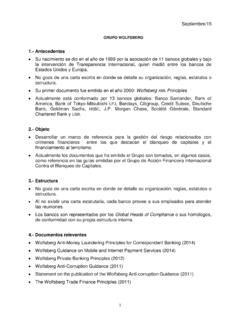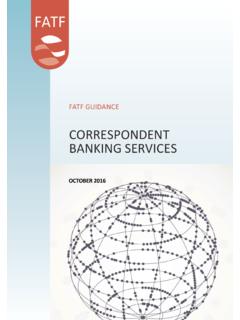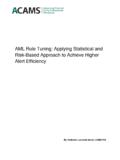Transcription of Practices and Recommendations aimed at …
1 Practices and Recommendations aimed at reducing the risk of money laundering and terrorist financing in the Luxembourg Fund Industry The Practices and Recommendations outlined in this document are adopted by the Association of the Luxembourg Fund Industry (ALFI), the Luxembourg Bankers'. Association (ABBL) and the Association of Luxembourg Compliance Officers (ALCO). December 2006. 2. Table of contents I. Preamble .. 4. II. Table of definitions .. 5. III. Scope of the Practices and Recommendations .. 8. IV. KYC obligations .. 8. A. The Registrar and Transfer Agent .. 8. B. The Global Distributor and the Distributors .. 8. C. The Custodian .. 8. V. Exemption from and Delegation of KYC requirements .. 9. A. Exemption from 9. B. Delegation of identification 10. VI. A risk based 10. A. Overview .. 11. B. AML/KYC country risk assessment methodology.
2 12. C. Criteria to assess equivalence in terms of identification requirements .. 12. D. Interpretation of equivalent identification 14. E. Country Classification .. 14. F. Distributor due 17. G. Application of the risk based approach to the initial due diligence process .. 19. H. Ongoing due diligence .. 20. I. Additional risk factors/indicators .. 21. VII. Contractual Equivalence .. 21. A. Legal clauses for contractual equivalence between the Professional and the 21. B. Delegation agreements .. 22. VIII. KYC and certification 22. A. KYC checklist .. 22. B. 22. C. Rules for identification of Investors via incoming payments from or cheques drawn on banks located in equivalent 22. IX. Monitoring of suspicious transactions .. 23. A. Monitoring of suspicious 23. B. Monitoring of blacklists and Politically Exposed 24. Appendix 1: Country risk AML/KYC assessment criteria for jurisdictions for which the equivalence status is not granted automatically.
3 25. Appendix 2: Detailed KYC checklists .. 31. 31. Preliminary 32. SUPRA NATIONAL ORGANISATION / GOVERNMENT DEPARTMENT / LOCAL AUTHORITY /. UNIVERSITY .. 41. 3. I. Preamble Luxembourg domiciled investment funds are promoted worldwide, with constantly growing trading volumes generated inside and increasingly outside the EU, the EEA. and the FATF-countries. Language barriers, tax reporting requirements and local standards require the Luxembourg fund industry to review operating models, including anti-money laundering standards and Practices , to remain attractive compared to other fund domiciles while maintaining high ethical standards. In consideration of: Directive 91/308/EEC of the Council of 10 June 1991 on the prevention of the use of the financial system for the purpose of money laundering;. Directive 2001/97/EC of the European Parliament and Council of 4 December 2001 amending Council Directive 91/308/EEC on the prevention of the use of the financial system for the purpose of money laundering.
4 Directive 2005/60/EC of the European Parliament and Council of 26 October 2005 on the prevention of the use of the financial system for the purpose of money laundering and terrorist financing;. Law of 12 November 2004 on the fight against money laundering and terrorist financing;. CSSF circular 05/211 on combating money laundering and terrorist financing and prevention of the use of the financial sector for the purpose of money laundering and terrorist financing;. professionals in the investment fund industry believe that anti-money laundering regulation needs to be applied consistently throughout the industry in order to uphold the reputation of the financial centre and to avoid regulatory arbitrage and competition based on differing interpretations of AML regulation. This document is to be considered as guidance on best practice for the Luxembourg fund industry in the light of the requirements of the law of 12 November 2004 on the fight against laundering and terrorist financing and the CSSF circular 05/211.
5 It suggests a risk based approach in relation to customer identification and transaction monitoring in alignment with international standards, including the FATF. Recommendations , the European Directive 2005/60/EC on the prevention of the use of the financial system for the purpose of money laundering and terrorist financing and the Wolfsberg Statement on Anti-Money Laundering Guidance for Mutual Funds and Other Pooled Investment Vehicles . It provides a methodology to assess the equivalence of legal and regulatory Know-Your-Customer requirements of foreign jurisdictions by comparing them to FATF standards. The extent to which actors in the fund industry follow the described Practices and Recommendations is under the responsibility of their respective governance bodies. The purpose of the document is furthermore to amend and replace the ABBL/ALFI.
6 Practices and Recommendations aimed at preventing the use of UCIs for money laundering dated March 2000 and the ALCO document Money laundering prevention in the framework of the transfer agent of a UCI administered in Luxembourg dated May 2003. 4. II. Table of definitions ABBL Association des Banques et Banquiers, Luxembourg ALCO Association Luxembourgeoise des Compliance Officers ALFI Association Luxembourgeoise des Fonds d'Investissement AML Anti-Money Laundering CDD Customer Due Diligence CTF Combating Terrorist Financing Circular CSSF circular 05/211 on combating money laundering and terrorist financing and prevention of the use of the financial sector for the purpose of money laundering and terrorist financing CSSF Commission de Surveillance du Secteur Financier Custodian Financial institution in charge of the safekeeping of the assets of the Investment Fund Distributor Financial professional which distributes units or shares of Investment Funds EEA European Economic Area EU European Union FATF Financial Action Task Force on Money Laundering (GAFI).
7 Global Distributor Financial professional which ultimately appoints and authorises all Distributors of an Investment Fund IMF International Monetary Fund IML Institut Mon taire Luxembourgeois, now CSSF . Investment Fund or Undertaking for Collective Investment (UCI) Investment fund domiciled and/or administered in Luxembourg Investments Investments and disinvestments in an Investment Fund 5. Investor Person, including ultimate economic beneficiaries and connected third parties (such as joint holders, proxy holders, etc.), who makes Investments KYC Know Your Customer / Know Your Distributor Law Law of 12 November 2004 on the fight against money laundering and terrorist financing NCCT Non-cooperative country and territory (as defined by the FATF). Nominee Account: Account opened in the name of a financial institution which, acting as the legal owner of such account, represents the underlying Investors.
8 Omnibus Account: Account representing a global position opened in the name of a financial institution in a shareholder register, aggregating positions of underlying Investors. PEP Politically Exposed Person(s). Practices and Recommendations These joint ALFI / ABBL / ALCO Practices and Recommendations constitute guidance on best practice for the Luxembourg fund industry Professional Agent, which is not hereby expressly excluded from the scope of the Practices and Recommendations , representing or acting on behalf of an Undertaking for Collective Investment, including but not limited to: - credit institutions and financial services professionals;. - management companies within the scope of the law of 20 December 2002 on Undertakings for Collective Investment or which conduct additional or auxiliary activities within the meaning of such law Registrar and Transfer Agent Professional whose activity consists in maintaining the Investment Fund's register, as such activity will be defined by law from time to time 6.
9 7. III. Scope of the Practices and Recommendations The Practices and Recommendations apply to UCIs and all Professionals as defined in the Table of Definitions here above. IV. KYC obligations A. The Registrar and Transfer Agent Where the UCI's Registrar and Transfer Agent is not the same entity as the Global Distributor, the KYC obligations of the Registrar and Transfer Agent are limited to the verification of the identity of the Investors whose instructions (subscription forms, transfer and redemption orders) have not been submitted by a regulated and supervised financial professional subject to equivalent AML and CTF obligations1. However, even though these Registrar and Transfer Agents have no responsibility in the due diligence process to be performed on appointed Distributors, they are obliged to perform an identification of the Distributor as per Section to ensure that the Distributor is subject to equivalent AML.
10 And CTF obligations. B. The Global Distributor and the Distributors Where the Registrar and Transfer Agent is not the same entity as the Global Distributor, it has in practice no or very little influence on the selection process of the Distributors and the inclusion of AML/KYC clauses in the distribution agreements signed between the Global Distributor and the appointed Distributors. It is the responsibility of the Global Distributor to develop and maintain a distribution network which complies with Luxembourg AML/KYC and FATF. standards. The due diligence process at both the country and Distributor level should be performed under the responsibility of the Global Distributor. The board of directors of the UCI and/or, as the case may be, of its management company is responsible for the appointment of the Distributors and should take all appropriate measures to ensure compliance with Luxembourg AML and CTF requirements and standards.
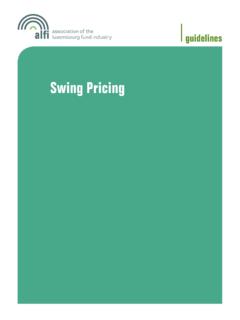
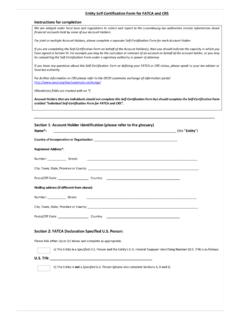




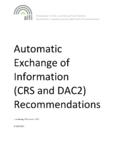


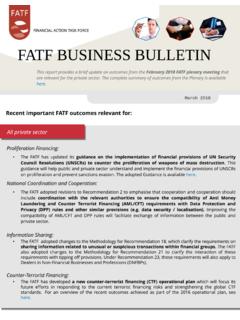
![-:HSTCQE=V]ZUVW: 20 2012 08 1 P - oecd.org](/cache/preview/7/2/d/a/9/f/9/f/thumb-72da9f9fb260ce23f17d3cca6cdecbc1.jpg)
